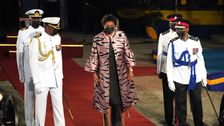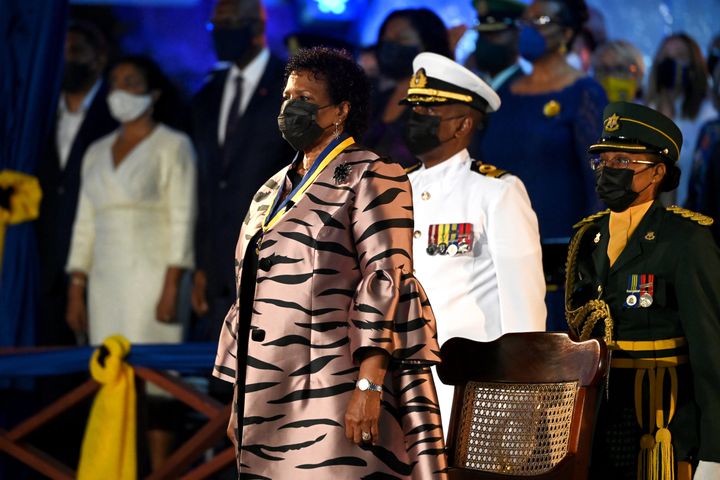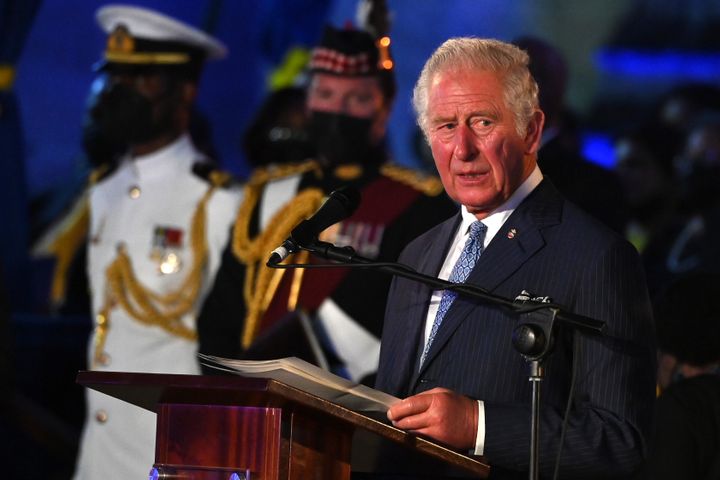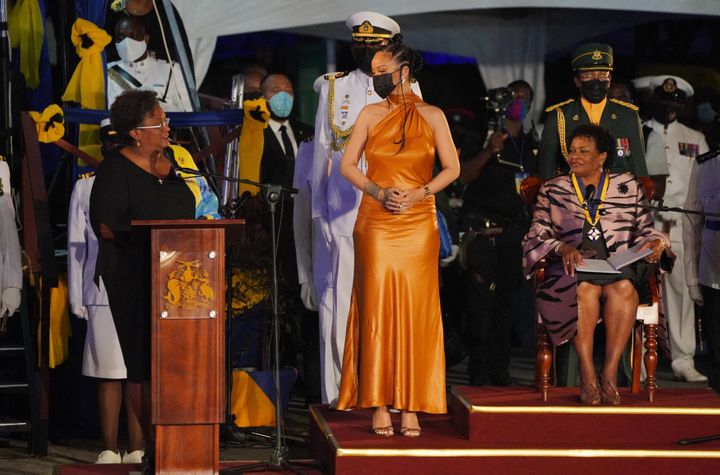
Barbados marked its 55th Independence Day on Tuesday, Nov. 30, by officially removing Queen Elizabeth as head of state and commemorating its new status as a republic.
The move from a constitutional monarchy to a parliamentary republic fulfilled a promise made over a year ago by Governor General Sandra Mason, who declared it was time for the country “to fully leave” its “colonial past behind” and make a Barbadian person the head of state.
Advertisement
Mason, who was elected the first president of Barbados in October, was formally sworn in Monday night at the National Heroes Square celebrations in Bridgetown. Prime Minister Mia Amor Mottley remains head of government.
“Since Independence we have built an international reputation anchored on our characteristics, our national values, our stability and our success, drawing on the lessons of those intervening years, possessing a clear sense of who we are and what we are capable of achieving,” Mason said, via Nation News, during her first presidential address amid the celebrations.

Jeff J Mitchell via Getty Images
“In the year 2021, we now turn our vessel’s bow towards the new republic,” she added. “We do this so that we may seize the full substance of our sovereignty.”
Prince Charles was on hand to celebrate the momentous occasion on Monday and Tuesday, as he will one day follow his mother as head of the Commonwealth, of which Barbados will remain a part.
Advertisement
During the ceremony, Charles was honored with the Order of Freedom of Barbados award for extraordinary service to the country ― a decision that was not without controversy, given the royal family’s ties to slavery in Barbados, which lasted for over two centuries.
David Denny, general secretary of the Caribbean Movement for Peace and Integration, told Reuters that the royals should pay reparations to Barbados. Mottley has also raised the issue of reparations in the past.
The Prince of Wales acknowledged the “appalling atrocity of slavery, which forever stains our history,” in a speech after the official transition to a republic and Mason’s inauguration.
“The creation of this republic offers a new beginning, but it also marks a point on a continuum, a milestone on the long road you have not only traveled, but which you have built,” the royal said. “From the darkest days of our past, and the appalling atrocity of slavery, which forever stains our history, the people of this island forged their path with extraordinary fortitude.”
Advertisement

Jeff J Mitchell via Getty Images
Queen Elizabeth also sent a message to Mason, and extended to Barbadians her “warmest good wishes for your happiness, peace and prosperity in the future.”
“It is also a source of great satisfaction that Barbados remains an active participant within the Commonwealth,” the queen said. “I look forward to the continuation of the friendship between our two countries and peoples.”
The night of celebrations also included an award for singer Rihanna, who was named a national hero in her home country. Mottley presented the Fenty businesswoman and nine-time Grammy winner with the honor, nodding to Rihanna’s 2012 hit “Diamonds” in her speech.
“On behalf of a grateful nation, but an even prouder people, we therefore present to you the designee for national hero of Barbados, Ambassador Robyn Rihanna Fenty,” Mottley said to cheers from the crowd. “May you continue to shine like a diamond.”
Celebrations aside, not everyone was in full support of the way Barbados’ government has handled becoming a republic. Some people ― like Verla De Peiza, a lawyer, former senator and current head of the Democratic Labour Party in Barbados ― thought Barbadians deserved more of a say in the process.

Pool via Getty Images
“As I canvass and I raise the republic conversation, what I’m hearing from our people is that they want a greater involvement in our democratic process and not a rehashing of the scene,” De Peiza told HuffPost last month.
“We’re starting at the back end of things with the republic. And it cannot be that we are going through a momentous occasion without consideration,” she said. “And therefore, what should feel like a joyous occasion is actually very undiplomatic.”
Even so, Graham Smith, head of the U.K.-based anti-monarchy group Republic, sees Barbados as a prime example for other countries that may be interested in cutting ties with the queen as head of state.
“Barbados isn’t just doing themselves a favour, but are showing the way for the other fifteen Commonwealth realms,” Smith said in a statement on Republic’s website.
“The transition in Barbados has also triggered calls for slavery reparations and an apology from the royals for their family’s part in the slave trade,” he added. “Those calls aren’t going away and there’s no way the royals come out of that debate without significant damage to their reputation.”
CORRECTION: An earlier version of this article incorrectly stated that Prince Charles is head of the Commonwealth. He is the future head of the Commonwealth.
Advertisement
Subscribe to HuffPost’s Watching the Royals newsletter for all things Windsor (and beyond).
Related posts:
Views: 0
 RSS Feed
RSS Feed

















 December 1st, 2021
December 1st, 2021  Awake Goy
Awake Goy  Posted in
Posted in  Tags:
Tags: 
















